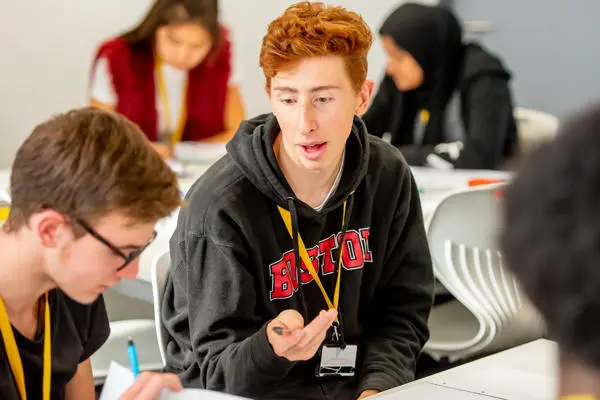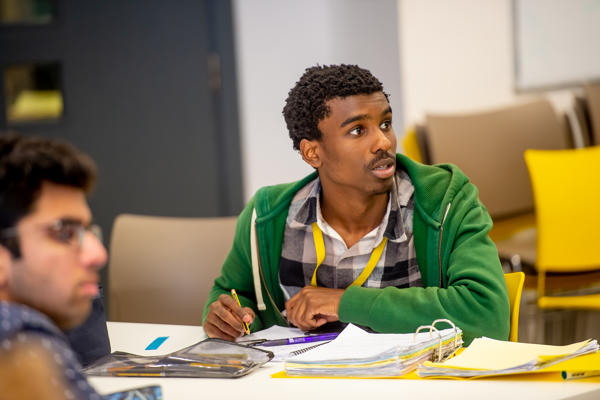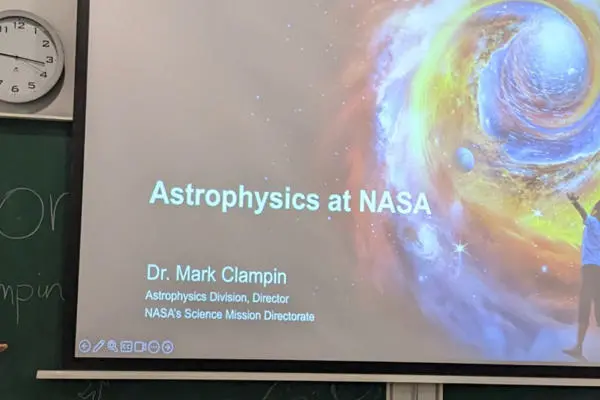
Core Curriculum
Mathematical developments have underpinned the technological and information revolutions that have transformed the modern world.
Mathematical developments have underpinned the technological and information revolutions that have transformed the modern world, and yet the subject is far more than simply a valuable tool for scientists, engineers and financial analysts: it is a beautiful, powerful, enriching and immensely stimulating subject.
What is mathematics about? In your experiences to date it may only be about learning how to solve specific types of questions, but this is a very incomplete and unfair picture of the subject. Mathematics is the study of patterns and structure. Mathematicians are key individuals in such a wide variety of roles in today’s world because of their ability to think abstractly and to generalise concepts, and these skills are the skills we will teach you.
At King’s Maths School, you will learn to think rigorously and precisely, but also creatively, to solve problems. You will learn to construct arguments and to justify them confidently. Mathematicians are the world’s greatest problem solvers, and you will join their ranks.
This page explains what you will learn at King's Maths School, in both our academic and broader curriculum. If you still have questions about our curriculum that are not answered by the information on this site, please do get in touch with us.
Extra curricular
We are committed to providing students with opportunities to participate in a wide variety of extracurricular activities during their time at KCLMS. There are numerous student-led clubs and societies to get involved with, including debate, philosophy, politics, knitting, “Among Us”, Minecraft Mondays, a newly formed instrumental music club, and much more.
One of our school’s central beliefs is ensuring students have a say in what is offered and available with regards to clubs. Students are always welcome to set up new ones if they are not able to find something of interest.
Students take part in many school-based, local and national competitions and academic challenges. These are all elective and are primarily a fun and exciting way to broaden students’ academic experience beyond the classroom. Activities include the United Kingdom Maths Trust challenges and Olympiads, as well as public speaking competitions.
Although these competitions are more about taking part and enjoying oneself, we have a lot of success in them. For instance, our female students regularly participate in the UKMT Maths Olympiad for Girls (MOG). In one MOG competition, our female students’ scores placed them in the top 25% of participants, 8 of whom were in the top 10%. One of our Year 12 students that year attained full marks - an achievement matched by only 11 others in the UK.
We have also excelled in public speaking competitions. For instance, KCLMS won first place in the Sheriffs’ Challenge Final, a prestigious inter-London debating competition.
Ultimately, the activities programme at KCLMS provide our students with opportunities to learn the value of teamwork, individual and group responsibility, diversity, competition and a sense of culture and school community.
Student council
Our students take an active role in school life and contribute in a significant way to our community. One of the ways in which they do this is through the student council, which encourages students to get involved in issues that concern them in and around school – and indeed beyond. Having this council helps creates a feeling of belonging, foments collaboration, and improves student and teacher relationships.
Our council, the voice of the student body, focuses on listening to and representing the views of students. Everyone deserves to feel like they have a say in school and we believe that this system allows our students to have the highest level of involvement. Put simply, the student council is a force for continuous improvement at KCLMS.
The student council consists of a chair and a vice chair, and year 12 and 13 officers representing Events, Charities + Environment, and Wellbeing + Diversity. Student council elections occur annually with the elected team organising events, working collaboratively with staff on school strategy, and ensuring wellbeing is at the heart of all that we do.
Speakers
We have numerous events that take place in school, including a large number of speakers delivering interactive talks so that students can participate with polls, Q&As, quizzes, etc.
Speakers come from a wide range of backgrounds and professions including science, maths, engineering, technology, economics, and investment banking. Recent virtual speakers have included Dr David Manheim, a super forecaster, who explained the value of information, and a senior trader from the investment bank JP Morgan, who introduced mathematical constructs used for market pricing.
Charities and the environment
As a school, we strongly believe that we have a duty to the people and the world around us, which is why we organise charity events to support our local community. These include charity Christmas Jumper Day, writing Christmas letters to people who might be experiencing loneliness and isolation, and organising food donations.
We also try to lower our carbon footprint and improve our school’s general environment by introducing plants to brighten up our buildings, using refillable whiteboard pens, and reducing printed materials in class. We also try to improve our sustainability and help various charities. We always welcome suggestions from teachers, students, and our general school community as to how we can make things better around us.
The King’s Certificate
The King’s Certificate is a brilliant program, whereby Year 12 students work in small groups on research projects. These projects are invariably fun and interesting and are mentored by people who are learned in the field. Previous projects include building a 3D-printer, mentored by Prof. Kawal Rhodes, who is a researcher at St. Thomas Hospital, to some more math-based projects, such as the fascinating Continued Fractions run by Emeritus Professor of Mathematics, Alice Rogers. This is only a small selection from the varied projects, so there will be something for every student. In addition, the King’s Certificate is structured so that there is not a large additional burden placed on students.
Collaboration
We like to create the best opportunities for students to work together with the aim of having collaborative and interactive spaces wherever possible. This aim is even imbued in the design of our building, where pods and inviting walls lined with whiteboards encourage collaboration and teamwork.
Students use whiteboards to solve problems as well as share and discuss ideas. The whiteboards also help create an atmosphere buzzing with engaged learning, independent thinking, and wide-ranging academic interest.
The IT tools and software we deploy in school also elicit collaborative action. Our classroom IT management system enables students and teachers to collaborate on the same document or presentation, whether in the same physical space or not.
In every lesson, students work together to help each other’s understanding of a particular activity, either by tackling problems in ‘group’ formation, or at whiteboards in ‘ring’ formation. Moreover, through programmes such as the King’s Certificate and national competitions, such as the Sheriff’s Challenge and the Math’s Bomb, students continue to collaborate.
In addition, KCLMS also runs Mathsaganza every year - a fun and collaborative problem-solving game, in which students work together in their vertical tutor groups. Students continuously challenge and develop each other, with a healthy and friendly dose of competition amongst everyone. In short, the community at KCLMS is very close, and this is largely due to the high levels of collaboration that permeate our school.

Mathematical developments have underpinned the technological and information revolutions that have transformed the modern world.

King’s Maths School aims to develop a broader set of skills than is possible through A-levels alone.

All students take A-levels in Mathematics and Further Mathematics. In addition, they study Physics and another option, choosing one of them to take on into Y13 to A Level. For those considering 2025 admissions entry, option subjects are likely to include: Computer Science, Economics and Philosophy.